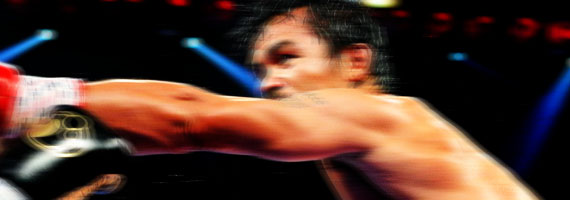 I don't know if I could ever be considered a Manny Pacquiao fan. I always wanted him to win, but being a fan implies positive feelings of support or a participation in excitement and joy. Mostly, what I felt was dread. During the height of Pacquiao's winning streak, I was worried about how this would all end. As a Filipino, I could not his significance to the people around me or the entire archipelago of the Philippines. I joked that should he ever lose, there would be a string of suicides in Manila, but underneath the hyperbole I believed the core of it. I didn't enjoy the suspense of his matches, or at least, I enjoyed them the way one might enjoy a horror film. The eventual victories were just sighs of relief until the next stressful bout.
I don't know if I could ever be considered a Manny Pacquiao fan. I always wanted him to win, but being a fan implies positive feelings of support or a participation in excitement and joy. Mostly, what I felt was dread. During the height of Pacquiao's winning streak, I was worried about how this would all end. As a Filipino, I could not his significance to the people around me or the entire archipelago of the Philippines. I joked that should he ever lose, there would be a string of suicides in Manila, but underneath the hyperbole I believed the core of it. I didn't enjoy the suspense of his matches, or at least, I enjoyed them the way one might enjoy a horror film. The eventual victories were just sighs of relief until the next stressful bout.
It's not a reasonable way to think by any means, but I've come to understand it as part of having an identity, whether it's based on ethnicity or hometown or shared hobbies. It's not purely that Pacquiao was Filipino, and therefore, I was obligated to emotionally invest in his career. It's just that I recognized a common ground, and that made him relatable, likable, and inclined to transpose all my hopes & dreams onto him (if you want to deconstruct it that far.) It would have been the same if I found out he listened to Titus Andronicus or read Batman comics. For a group starving for representation in even the most inconsequential of venues (So You Think You Can Dance! American Idol! Top Shot?) every chance to root for someone that looks like you is a gem.
Of course, this kind of identification has boundaries. Comedian Hari Kondabolu has a great bit where, upon deciding that there are now plenty of Indians in American mass media, he now feels free to openly hate some of them. While I don't think I've personally reached that level of saturation, I understand the idea of divorcing those that don't line up with the rest of your identity. There are figures you'd think I would identify with (Say, half-Filipino singer Bruno Mars), but they do things that I absolutely don't see myself in (cheeseball R&B songs). My tendency as a minority participant in pop culture has been to relate to someone until they do something that says, nope, sorry, you can't.

